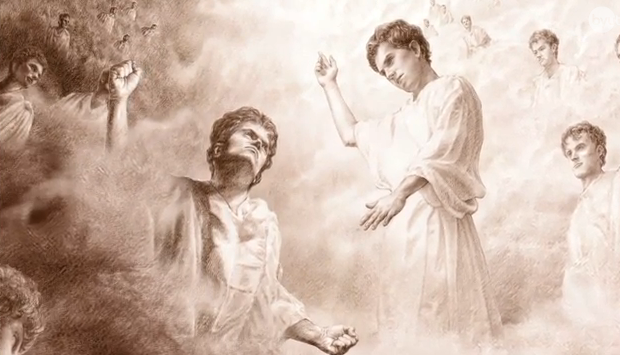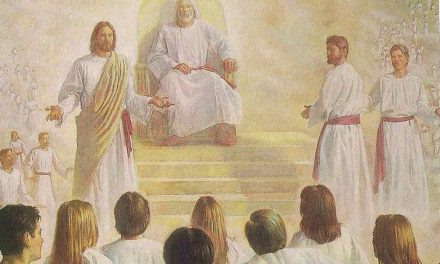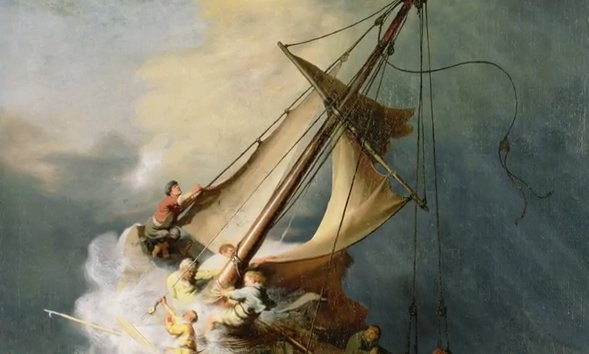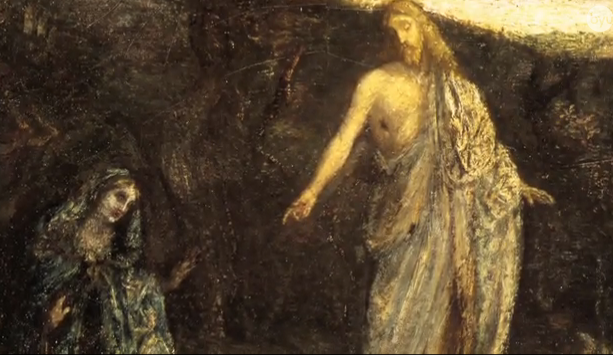MARCUS H. MARTINS: In the Pearl of Great Price, we obtain some important pieces of information about the Savior in his premortal work. We also find Abraham’s account of one of these conversations with the Lord. And one of the remarkable aspects here is that Abraham is dealing with the premortal Savior. He introduces Himself, He says, “My name is Jehovah” (Abraham 1:16; 2:8). Abraham also comes to saying that “the Lord placed his hand over my eyes, and I could see the works of his hands, and they multiplied before me and I couldn’t see the end of them” (see Abraham 3:12). That’s another important insight we learn, that not only Jesus Christ was God even before this life, but that He being the Creator of worlds without number, was not a beginner, that this earth where we live, and these experiences that we have here are really nothing new in the eternities, and that the Lord is not experimenting with us and hoping that something good comes out of this plan of salvation. No, He has done this countless times.
ALISON COUTTS: We look at the Hubble telescope, and we see all those incredible images of galaxies without end, that have just been created by the Savior, and we have in Abraham 3:12 how this all happens. And He shows him worlds without end, and Abraham cannot see the end of everything that was created.
 MICHAEL D. RHODES: In Abraham chapter 3 we have a remarkable description of the pre-existing council in heaven. And in this council in heaven, it says many of the noble and great ones were gathered together, the children of God. And it explains that these noble and great were in fact those that were spirits, as contrasted with the intelligences that have always existed (see Abraham 3:22–23). So these were the spirit children of God that we’re dealing with here. And one among them stood up, who was like unto God. Jesus Christ of course is, is who is referenced here, talking about the plan to go down to this area where there’s materials that they can build a place where—an earth—where people, these children of God may dwell.
MICHAEL D. RHODES: In Abraham chapter 3 we have a remarkable description of the pre-existing council in heaven. And in this council in heaven, it says many of the noble and great ones were gathered together, the children of God. And it explains that these noble and great were in fact those that were spirits, as contrasted with the intelligences that have always existed (see Abraham 3:22–23). So these were the spirit children of God that we’re dealing with here. And one among them stood up, who was like unto God. Jesus Christ of course is, is who is referenced here, talking about the plan to go down to this area where there’s materials that they can build a place where—an earth—where people, these children of God may dwell.
JOSEPH FIELDING MCCONKIE: Our Eternal Father gathers together his family in what we call the Grand Council. And in that council the Father comes and He reviews with us the whole system and plan of salvation. It’s important to understand that it’s His plan, that it comes from him.
MICHAEL D. RHODES: God the Father then makes a proposal: “Whom shall I send?” (Abraham 3:27). In this mortal existence, we’re going to be in a condition where we’re going to make mistakes, and a Savior in needed. And Christ—God the Father is asking for a volunteer.
ALISON COUTTS: The Father’s question, “Whom shall I send?” makes you wonder in a way. Because obviously He wanted to send the Son. And that was—the Son was foreordained to do this. But then it makes you also think of the Garden of Gethsemane, when the Savior says, “If this cup can be taken from me; nevertheless, thy will be done” (see Luke 22:42). So I don’t think He was certain that He could do this. And I imagine that that element of uncertainty was pivotal for somebody to take on this sacrifice, this great Atonement, this great sacrifice. It had to be a sacrifice not only for the Father to sacrifice His Son, but also for the Son to do this not knowing that He would be able to undertake it.
On the other hand, you have Lucifer, who probably has no intention whatsoever of undertaking such a sacrifice. His character is—such that we know of—that there’s no way that he would do anything that would jeopardize himself. He wanted guarantees all the way through. And for those guarantees, he wanted all the glory.
DAVID M. WHITCHURCH : “And there was war in heaven, Michael and his archangels fought against the dragon, and the dragon fought and his angels” (Revelation 12:7). And in this highly symbolic language we recognize that this wasn’t a war that was made up of swords and weapons like we might think in a conventional war. This was a war of testimony, this war of belief.
RICHARD D. DRAPER: Revelation is extremely symbolic, but symbolic in a way that really throws us. Because in the visions of John he actually sees things that quite frankly in the real world are impossible combinations. And what we have to understand is that the revelation was not given to the eye, it was not given to the pen or the brush, but rather Revelation was given to the mind. It’s a riddle that forces us to tease out the meaning behind the revelation.
PAUL Y. HOSKISSON: Satan is depicted as a dragon or a serpent, a very interesting piece of symbolism here. And I’ve often wondered about what that symbolism means, you know, because the Lord uses all kinds of symbols when he’s talking, and the great dragon of course we know is a symbol for Satan, as it says in verse 9: “that old serpent called the devil and Satan” (Revelation 12:9) This is not meant to—we’re not supposed to picture Satan as a dragon or as a snake or as a serpent. This is symbolic of who he is and what he does. He destroys, he’s frightful, he’s scary.
RICHARD D. DRAPER: In that rage he wants to bring everything down, so we just really see the power of Satan in order to destroy. So far as the angels are concerned, the angels are us, okay, those who were in God’s side, and took a place in that battle. Which tells us that we were not just simply entities that were awash in that premortal world, but we were actually participants in this battle. We took a stand; we did things during this time that assisted the Lord in His work and ministry there.
ALISON COUTTS: To realize that the Savior has faith in us as we have faith in Him, that He has faith in us to do what he’s asked us. And what He’s asked us, compared with what He has done, is so minimal, is one of the most strengthening things of the gospel, and one of the things that enables me, all of us, to do what He’s asked us to do.
GAYE STRATHEARN: You recall that immediately after the stilling of the stormy sea, Jesus and His disciples disembark at Gadera, or more probably, as Matthew recalls, in the country of the Gergesenes, which is right over here on the east side of the Sea of Galilee. There they’re met by a man who’s possessed with a legion of devils (see Matthew 8:28).
S. KENT BROWN: I remember the story, this man has been living in the tombs. And there’s a very interesting way that Mark describes this. When he saw Jesus afar off, he ran—I love that—he ran and worshiped him, and cried with a loud voice, and said, “What have I to do with thee, Jesus thou Son of the Most High God?” (Mark 5:7). I love that passage.
JOHN S. TANNER: You know, in a way, both these events, the calming of the sea, and the encounter with the demon, attest to Jesus’ premortal stature. Because when the demons recognized Him as the Son of the Most High God, they’re simply stating something that they learned long ago in the pre-existence. And when the waters are calmed by Him, they’re responding to the command of Jehovah, who parted the waters for Moses, and who divided the waters from the dry land in the beginning.
MICHAEL D. RHODES: Michael of course, as Joseph Smith explains, is none other than Adam, and his name interestingly enough, it means “who is like God.” Michael was one of the noble and great in standing. He was chosen to be the father of the human race, who through his righteousness and faith and preparation, was able to carry out that great role. He is the patriarch of the entire human race.
PAUL Y. HOSKISSON: And it’s that person, the one who’s like God, Michael, who’s chosen to lead the heavenly forces against Satan, the dragon. It seems to me that the Savior, as is often the case, has delegated some of his authority and his directions to Michael in the war in heaven, because it’s clearly Michael that is leading the forces of good against the forces of evil. But it’s the blood of the Lamb, it’s the Savior, it’s the Atonement, that wins the day for the winning side in this. And it’s the faith of the people in Christ, that He’s going to go through with it, that He’s going to accomplish the Atonement, that wins their hearts over to Him. It’s the words of Michael and his angels who win over the hosts of heaven, and bring about the victory for Christ in the pre-existence.
RICHARD D. DRAPER: Alma 13 gives us a very, very interesting insight. Doesn’t tell us a lot about the war itself, but does show us the stage on which that war was fought. “And those priests were ordained after the order of the Son of God, in a manner that people might look forward to their redemption that would come through the Son. And this is the manner after which they were ordained, being called and prepared from the foundation of the world, according to the foreknowledge of God, on account of their exceeding faith and good works in the first place, being left to choose good or evil, therefore they, having chosen good and exercising exceeding great faith, are called with a holy calling”—verse 4—“and thus they had been called with this holy calling on account of their faith, and others would reject the spirit of God on account of the hardness of their heart and the blindness of their minds, while if it had not been for this thy might have had as great privilege as their brethren, or in fine in the first place they were on the same standing” (Alma 13:2–5). Now essentially what this tells us, that there is agency fully at play in this premortal world. And there were those who opted for God. But I want you to notice the phrase exceeding great faith. And again we get back to what we see in Revelation, which is what? That the blood of Christ had not yet been shed. The truth of the matter is, Jesus had not yet made the Atonement, and therefore we had to have faith in the word of the Father, and faith in the promise of the Son that He would indeed pull off the Atonement. And so what happens in that war in heaven, is we put all our eggs, as it were, in one basket. What we said was, Jesus will not fail. Even though there’s no backup system, Jesus will not fail. We know he will not fail, and therefore we are willing to lay it on the line, and then go out and bear witness to that, these powerful words that we use based on that philosophy. And again, it won the day. Two thirds indeed did opt for Jesus, and therefore stayed with him in the heavenly realms.








